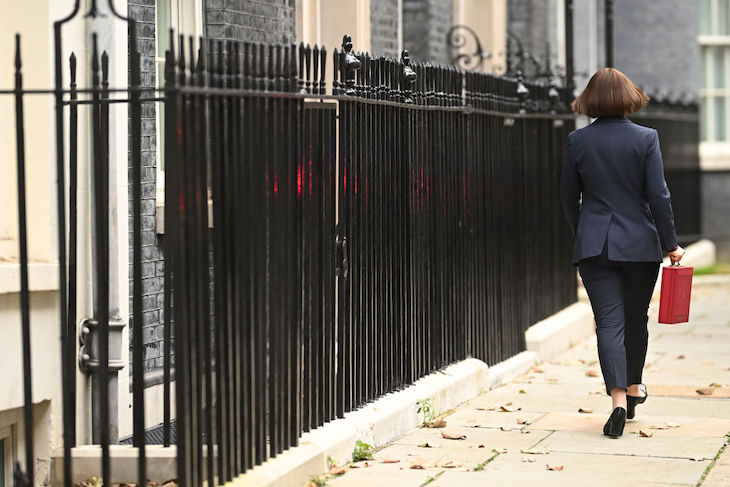‘No plan for the economy’ is the charge being made against the government, as Conservatives take to the airwaves following the Budget.
The problem is that, in this case, the charge is simply untrue. Labour do have a plan for the economy. It is called securonomics: a worldview set out in some detail by the Chancellor herself in the Spring during her Mais Lecture. And as Paul Mason put it earlier in the year in this magazine, securonomics constitutes a ‘coherent, well founded’ plan for the economy, rooted in a ‘clear political philosophy’.
Securonomics will make Britain more lethargic, more risk averse
Securonomics, at its most basic level, is a theory about the relationship between the state and the market. In ‘an age of uncertainty’ and greater complexity, it considers a larger, activist state as a necessary development in the British economy. ‘A modern state must be more active,’ she wrote in a Labour Together paper, and work together in ‘partnership’ with business and trade unions to deliver particular outcomes.
Over the last fourteen years, the Conservatives have been the ostensibly reluctant midwives of a bigger, more interventionist state. But advocates of securonomics genuinely believe in one.
The Autumn Budget was the policy manifestation of this economic worldview, and the first opportunity for Reeves to put securonomics into practice. In concrete terms, what the Chancellor has done this week is instigate a profound transfer of resources away from productive parts of the economy and towards the state.
The Chancellor’s tax rises are in cash terms the largest in history. And while increased investment is the broader theme of her budgetary decisions, that large quantum of extra tax revenue will go towards boosting spending on the day-to-day operations of a larger and more active state.
The Budget has also reinforced a shift in decision-making authority away from households and businesses and into the hands of government. The government will now dictate to a greater extent the conditions under which businesses can take on workers. By ramping up borrowing by £142 billion over the forecast period, the government is also indicating its confidence that it can make superior investment decisions to private enterprises. And this is ultimately why they are changing the debt measure too; to facilitate an expanded role for an active state through increased borrowing.
Labour certainly has a plan, then: a plan for a great deal more planning in our economy – by the National Wealth Fund, by British Energy, by the Industrial Strategy Council, by Rachel Reeves. It’s just that their plan promises to be entirely unconducive to the task of building a more prosperous Britain. Securonomics will make Britain more lethargic, more risk averse, and more reliant on high levels of state spending.
Take regulation. On Monday, the Prime Minister stated that his government would ‘strip out needless regulation’ holding back enterprise and investment. But a greater regulatory burden is and must be the counterpart to greater economic direction from government. ‘Day one’ rights, and ‘fair pay agreements’ sound like pro-worker policies. But they will destroy jobs, stunt real pay growth and lump a £5 billion burden on British businesses.
What about investment? Everyone is agreed on the desperate need for higher levels of investment – both public and private – to support productivity growth. The question is how it should be funded. By doing so through borrowing rather than day-to-day spending restraint while simultaneously increasing Capital Gains tax, the government will, as the Office for Budget Responsibility has forecasted, impair incentives for private investment, offsetting any uptick in public investment.
Across the decisions made during the Budget, the Chancellor has conducted ‘a hands-on rebalancing between market forces and state control, tipping more power towards the latter’. Investment needs to have ‘guardrails’, so that it advances the political ends of the government. Risk taking by businesses needs to be regulated, so that the state can guarantee the security of workers. Money needs to be shifted from businesses to the government, because the latter knows how to spend it better.
This is, of course, but a rearticulation of a very old economic dogma – that in a complex society, the government can make better decisions than you can. That the welfare state can better provide for people’s security than households savings and private investment can. And as surely as night follows day, its practical effects when acted upon will be the same – inflation, higher taxes, and wealth destruction.
Whoever is elected the leader of the Opposition in just a few days’ time may find it very difficult at first to unify the Conservative party around an alternative governing agenda. They might, however, find it comparatively easier to galvanise Conservatives around a critique of securonomics – an economic worldview that is deeply antithetical to a free and enterprising economy, and one which will ultimately prove to be impoverishing.







Comments